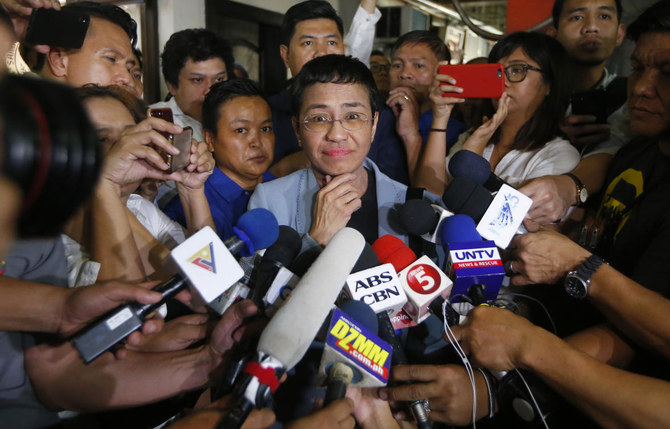MANILA: The Nobel Peace Prize was awarded on Friday to journalists Maria Ressa of the Philippines and Dmitry Muratov from Russia for their work on freedom of expression.
Ressa is the first Filipino to win a Nobel. She is a co-founder of the digital news and investigative journalism outlet Rappler, which is known for its tough scrutiny of President Rodrigo Duterte.
Muratov co-founded the independent newspaper Novaya Gazeta in 1993 and has been its editor in chief since 1995.
The Norwegian Nobel Committee chose them out of 329 candidates, recognizing the duo “for their efforts to safeguard freedom of expression, which is a precondition for democracy and lasting peace.”
The committee said: “They are representatives of all journalists who stand up for this ideal in a world in which democracy and freedom of the press face increasingly adverse conditions.”
It cited Ressa’s work and criticism of the Duterte regime’s “controversial, murderous anti-drug campaign. The number of deaths is so high that the campaign resembles a war waged against the country’s own population.”
The Philippine government’s antidrug policy and campaign launched in 2016 and has since led to the deaths of over 12,000 Filipinos, mostly the urban poor, according to Human Rights Watch estimates. At least 2,555 of the killings have been attributed to the Philippine National Police.
In a video interview with Rappler after the Nobel committee’s announcement, Ressa described the win as a shock.
“The fact that a journalist from the Philippines and a journalist from Russia won the Nobel Peace Prize tells you about the state of the world today and the state of the Philippines,” she said, dedicating her win to her Rappler colleagues.
“The recognition of how difficult it is to be a journalist today, this is for you Rappler, and I hope energy for all of us to continue the battle for facts. I think what we have to do as journalists is to just hold the line ... When you attack the media, oftentimes it’s about shooting
the messenger.”
Rappler said it was “honored and astounded” by Ressa’s win.
“We thank the Nobel for recognizing all journalists both in the Philippines and in the world who continue to shine the light even in the darkest and toughest hours. It could not have come at a better time — a time when journalists and the truth are being attacked and undermined.”
Ressa has faced several cases and arrest warrants in what government critics see as politically motivated charges for critical coverage of Duterte’s administration.
The National Union of Journalists of the Philippines congratulated Ressa and Muratov, saying the win was not only a recognition of their work, but of the importance of freedom of the press and of expression in their countries and throughout the world.
“We commend them for defending these freedoms in increasingly challenging conditions — in Ressa’s case, these challenging conditions have included a raft of cases and legal proceedings — and are proud to be in the community of independent journalists ready to hold the line with them,” the NUJP said. “We hope this award will shine more light on those who put the spotlight on the truth at a time when basic freedoms and democracy are under attack.”
The Foreign Correspondents Association of the Philippines called Ressa’s win a victory for press freedom advocates across the country.
“Reporters routinely face online harassment, local newsrooms face pressure to self-censor, and regional journalists remain the most vulnerable to violence, including detention and killings,” FOCAP said. “We hope that Ressa’s win drives international attention to the plight of the Philippines’ local media workers, and sends a signal that a free, unstifled and critical press is necessary for a healthy democracy.”
The prestigious award worth $1.1 million — one of the five Nobel prizes established by the will of Swedish industrialist Alfred Nobel — each year honors individuals or organizations that have “done the most or the best work for fraternity between nations.”
Peace prize recipients are selected by the Norwegian Nobel Committee in Oslo, while awards in medicine, physics, chemistry, literature, and economic sciences are announced from various institutes and academies across Sweden.
Last year’s peace prize went to the UN World Food Program for its efforts to combat hunger and improve conditions for peace.
























